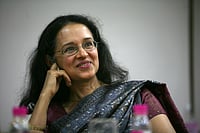The Economic Survey 2019 was released by Chief Economic Advisor KV Subramanian today and it picked up some important things like demography and retirement age in chapter titled as India's Demography at 2040: Planning Public Good Provision for the 21st Century. So lets quickly go through all-important facts mentioned in economic survey about demography, jobs and retirement age.
In this chapter first important thing that is mentioned is about India’s declining young population by 2041. India’s population growth has slowed down from 2.5% during 1971-81 to 1.3% during 2011-16. However, it has also mentioned that some states in southern part of India and Orissa and West Bengal are witnessing below 1% of population growth.
It also mentioned that India has ushered in the new stage of demographic transition with population growth set to slow with rising working age population.
India’s population growth will continue to slow rapidly and will grow at 1% during 2021-31 and 0.5% during 2031-41.
Also the fact that is worth pondering over is that India’s young population falling in the age bracket of 0-19 years is also declining at very fast pace. It is projected to drop from 41% in 2011 to 25% by 2041.
And on the other hand the share of elderly people will continue to rise and will double from 8.6% in 2011 to 16% by 2041.
India’s demographic dividend will reach its peak around 2041 when the share of working age population falling in the age bracket of 20-59 years will form 59% of population.
And India’s age structure during 2041 will be similar to that of China and Thailand as seen during the current decade.
India’s working-age population will continue to increase through 2041, rising by 96.5 million during 2021-31 and by 41.5 million during 2031-41
In economic survey it is discussed at length that additional jobs will need to be created to keep pace with the projected annual increase in working-age population of 9.7 million during 2021-31 and 4.2 million during 2031-41. Projecting labour force participation is beyond the scope of this study, but this will be impacted by changes in schooling years, age distribution and female labour force participation
As life expectancy for male and female is rising in India thus it’s become imperative to raise the retirement age, taking cue from the developed countries across the world.
In the UK, for example, the state pension age will increase for both men and women to 66 by October 2020. The UK government is planning further increases in the retirement age to 67 spanning the years 2026-28 and to 68 during 2044-46. In Germany, the retirement age is to increase gradually to 66 by 2023 and to 67 by 2029.
In India increasing the retirement age will be key to the viability of pension systems and would also help increase female labour force participation in the older age-groups.
In the economic survey it is mentioned that since increasing the retirement age is inevitable in India. Thus, it is worth signalling that this change well in advance, a decade before the anticipated shift.

























